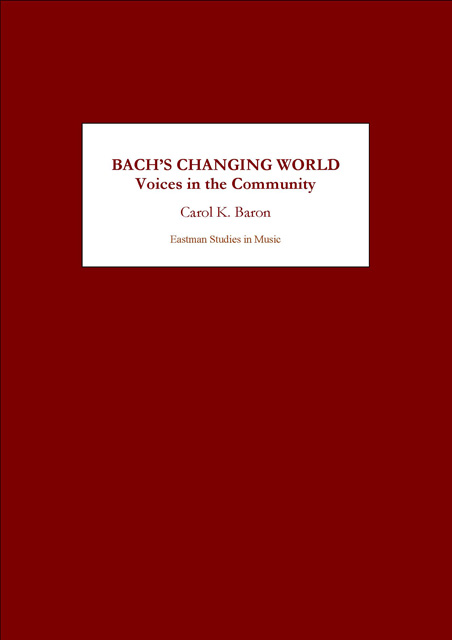Book contents
- Frontmatter
- Dedication
- Map
- Contents
- List of Illustrations
- Editor's Acknowledgments
- 1 Transitions, Transformations, Reversals: Rethinking Bach's World
- 2 Tumultuous Philosophers, Pious Rebels, Revolutionary Teachers, Pedantic Clerics, Vengeful Bureaucrats, Threatened Tyrants, Worldly Mystics: The Religious World Bach Inherited
- 3 Family Values and Dysfunctional Families: Home Life in the Moral Weeklies and Comedies of Bach's Leipzig
- 4 Bach in the Midst of Religious Transition
- 5 Bach's Situation in the Cultural Politics of Contemporary Leipzig
- 6 The Reception of the Cantata during Leipzig Church Services, 1700–1750
- 7 From Salon to Kaffeekranz: Gender Wars and the Coffee Cantata in Bach's Leipzig
- 8 A Treatise on Liturgical Text Settings (1710)
- 9 Random Thoughts About Church Music in Our Day (1721)
- Notes on the Contributors
- Index
- Eastman Studies in Music
4 - Bach in the Midst of Religious Transition
Published online by Cambridge University Press: 17 March 2023
- Frontmatter
- Dedication
- Map
- Contents
- List of Illustrations
- Editor's Acknowledgments
- 1 Transitions, Transformations, Reversals: Rethinking Bach's World
- 2 Tumultuous Philosophers, Pious Rebels, Revolutionary Teachers, Pedantic Clerics, Vengeful Bureaucrats, Threatened Tyrants, Worldly Mystics: The Religious World Bach Inherited
- 3 Family Values and Dysfunctional Families: Home Life in the Moral Weeklies and Comedies of Bach's Leipzig
- 4 Bach in the Midst of Religious Transition
- 5 Bach's Situation in the Cultural Politics of Contemporary Leipzig
- 6 The Reception of the Cantata during Leipzig Church Services, 1700–1750
- 7 From Salon to Kaffeekranz: Gender Wars and the Coffee Cantata in Bach's Leipzig
- 8 A Treatise on Liturgical Text Settings (1710)
- 9 Random Thoughts About Church Music in Our Day (1721)
- Notes on the Contributors
- Index
- Eastman Studies in Music
Summary
To a historian struggling to grasp the role of music in early eighteenth-century German Lutheranism, the frank admission of a contemporary music theorist that church music styles were confusing and changing is refreshing. Friedrich Erhardt Niedt, writing in the third part of his Musicalische Handleitung in 1717, was convinced “that not even a composer can tell me what the correct church style is nowadays.” Musical styles, it seems, were changing as quickly and irrationally as dress fashions. Although he recognizes as many as three acceptable genres of church music—motets, concerted music, and arias—his advice to church musicians is deceptively simple: one should inquire as to the listeners’ musical preferences before choosing. His solution lies in inclusivity: “In this way he has all the rules of the church style together unmistakably” (38). Such a pragmatic approach defies our efforts to paint a neat picture of church music trends in Bach's time. Were any congregations so unanimous in their taste that the choice was obvious? Certainly German Lutherans as a whole were not unanimous, as the acrimonious debates of the late seventeenth and early eighteenth centuries demonstrate.
Beginning with Theophilus Grossgebauer's 1655 work Wächterstimme aus dem verwüsteten Zion (Voice of the Watchman from ravaged Zion), some Lutherans had divided church music styles into good solid, sober, German music and flighty, tumultuous, Italian music. Grossgebauer charged most of those making music in the churches with being unspiritual people, a charge which was broadened in the hands of subsequent participants in this debate into a demand that church music emanate only from regenerate persons. Gottfried Vockerodt (1665–1717), a Pietist theologian and school rector in Gotha writing in the last decade of the seventeenth century, focused the debate on the question whether there could be any morally indifferent actions. Provoked less by innovations in church music than by student musicians’ participation in opera and theater productions, Vockerodt regarded the French-influenced theater of the time as a threat to moral standards and devotion to God. Those who were more in the forefront of culture, such as Johann Beer, novelist and concertmaster at the court in Weissenfels, felt there was plenty of room for harmless recreation in the large middle ground of morally neutral activities. He and his allies painted Vockerodt as another humorless foe of music.
- Type
- Chapter
- Information
- Bach's Changing WorldVoices in the Community, pp. 108 - 126Publisher: Boydell & BrewerPrint publication year: 2006
- 1
- Cited by



